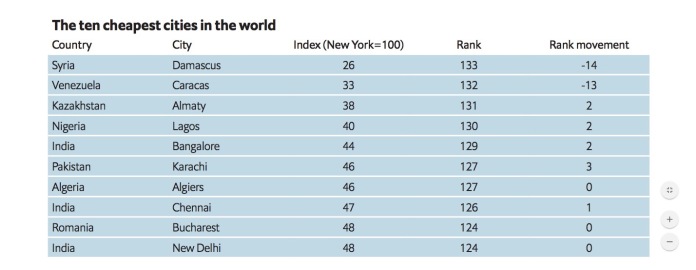The Economist Intelligence Unit conducted a study, reporting the Worldwide Cost of Living as of 2018. The aim of the study was to understand which respective cities involved the most and least amount of investment and/or spending for both businesses and individuals.
How Was the Study Conducted?
The survey compared the prices of 160 goods and services in 133 cities around the world. Human resources managers then had to calculate compensation packages for overseas postings and conclude the placement of these various 133 cities accordingly. Therefore, the findings of the study can be regarded as fairly reputable and representative of the population in the different cities.
What Were the Findings? What Does It Mean to us?
The results suggested that this was a “year of currency fluctuations”, which explained why there were so many changes in the rankings. The report further observed that there were “changes at the bottom”. “Within Asia, the best value for money has traditionally been offered by South Asian cities, particularly those in India and Pakistan”, it says. Therefore, unlike other countries at the bottom of the list, the presence of Indian cities and Karachi are shown to be quite expected.
The report claims, “To an extent, this remains true, and Bangalore, Chennai, Karachi and New Delhi feature among the ten cheapest locations surveyed. India is tipped for rapid economic expansion, but in per head terms wage and spending growth will remain low”. And they argue the reason for that to be “High-income inequality” in India.
“This, combined with a cheap and plentiful supply of goods into cities from rural producers with short supply chains as well as government subsidies on some products, has kept prices down, especially by Western standards”. The reference to a “short supply chain”, essentially indicates that there are fewer middlemen for the consumer to access a product. As a result, the price reduces to a large extent.
While referring to the cheapest cities in the world, the same intelligence unit says the cities are “cheap but not always cheerful”. The main emphasis on ‘not being cheerful’ is placed on the Syrian and Venezuelan capitals, “Damascus and Caracas show, a growing number of locations are becoming cheaper because of the impact of political or economic disruption”.
However, India still remains well in the picture. The report states, “instability is becoming an increasingly prominent factor in the Indian subcontinent in lowering the relative cost of living”. They thus conclude that there is a “considerable element of risk in the cheapest cities”: three of which are India’s in the top 10.
The EIU seems to believe that while Lagos, Karachi, Algiers and Almaty have faced socio-economic, political, security and infrastructural issues in the past, India’s main issue seems to be the “high-income inequality” and “instability”. They also say that ‘Cheaper cities tend to be less liveable’.
When three of our most popular cities, including our national capital, is the “cheapest cities in the world”, it is apparent that a sense of being less “liveable” is reflected by the study. At least in theory.




